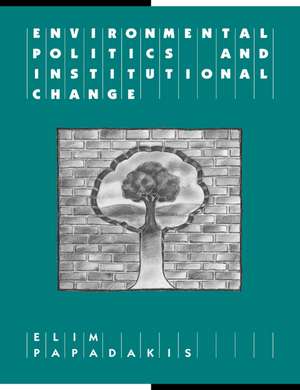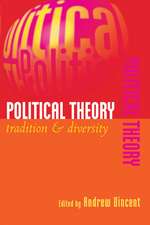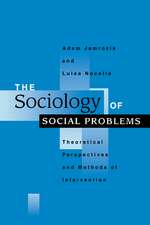Environmental Politics and Institutional Change: Reshaping Australian Institutions
Autor Elim Papadakisen Limba Engleză Paperback – 17 noi 1996
Preț: 313.22 lei
Nou
Puncte Express: 470
Preț estimativ în valută:
59.95€ • 62.94$ • 49.53£
59.95€ • 62.94$ • 49.53£
Carte tipărită la comandă
Livrare economică 30 ianuarie-13 februarie 25
Preluare comenzi: 021 569.72.76
Specificații
ISBN-13: 9780521556316
ISBN-10: 0521556317
Pagini: 256
Ilustrații: 2 b/w illus.
Dimensiuni: 189 x 246 x 14 mm
Greutate: 0.46 kg
Editura: Cambridge University Press
Colecția Cambridge University Press
Seria Reshaping Australian Institutions
Locul publicării:Melbourne, Australia
ISBN-10: 0521556317
Pagini: 256
Ilustrații: 2 b/w illus.
Dimensiuni: 189 x 246 x 14 mm
Greutate: 0.46 kg
Editura: Cambridge University Press
Colecția Cambridge University Press
Seria Reshaping Australian Institutions
Locul publicării:Melbourne, Australia
Cuprins
Part I. Introduction: 1. Innovation and tradition; 2. Stimulus and response: the rise of environmentalism; 3. Framing the analysis; Part II. Political Institutions, Innovation and Social Change: 4. The 'centrality' of political institutions; 5. The circularity of political communication and dialogue; 6. Disrupting the circularity of political communication: the role of social movements; 7. Design, evolution and the environmental movement; Part III: Political Organisations and Adaptation: 8. Inertia and innovation; 9. Missed opportunities: the Liberal and National parties; 10. Leading the charge for the green vote: The Australian Labor Party; 11. Fundamentally green: the Australian Democrats; 12. Overcoming institutional inertia; Part IV. The Media, Agenda Setting and Public Opinion: 13. The articulation of environmental issues by the media; 14. Media stereotypes and adaptation; 15. Public opinion and survey research; 16. Mass opinion on environmental issues; Part V. Conclusion: 17. Possibilities for constructive dialogue.
Descriere
An examination of the responsiveness of Australian political institutions to environmental concerns.































